As a small business entering a new year, it’s important to know two things:
1. The broader digital marketing trends to expect in the industry as a whole, and
2. The smaller tactical strategies that are mainstream and already in full swing.
The former is for readiness and results in the long term while the latter is for relevancy and results now.

That being said, read on for the 13 best marketing strategies for small businesses in 2023.
Table of contents
The best PPC marketing strategies for 2023
A cross-channel strategy is best for paid media as a whole, but these strategies are focused on search and social.
1. Go broad on Facebook…
Privacy measures are impacting every aspect of marketing, but for Facebook advertising in particular, we are seeing reducing numbers in audience sizes—both the ones you can select within the platform and your remarketing audiences from website traffic. You want to make sure you give the algorithm enough data to work with, so whether you’re just running campaigns as usual or trying to scale your Facebook ads, keep your audiences broad. You can do this by:
- Stacking interests.
- Targeting interested based on pages with large followings in your niche.
- Expanding your lookalikes from 1% to 5%.
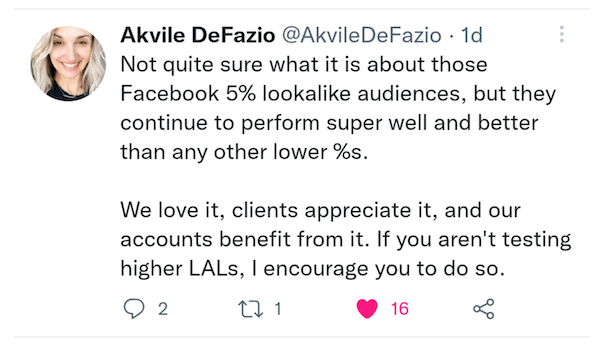
You can find even more tips and strategies in our 2023 Facebook advertising trends post.
2. …but not on search
ICYMI, search advertising cost per lead has increased significantly this past year. As you can see in the full report (You can download the PDF here), there are a number of trends behind this, but one of them is that of broad match becoming broader than ever.
Google is not only pushing advertisers to use broad match, but also showing ads more broadly across SERPs that don’t have commercial intent. So the strategy here: stick with phrase and exact match and stay on top of your negative keyword lists.
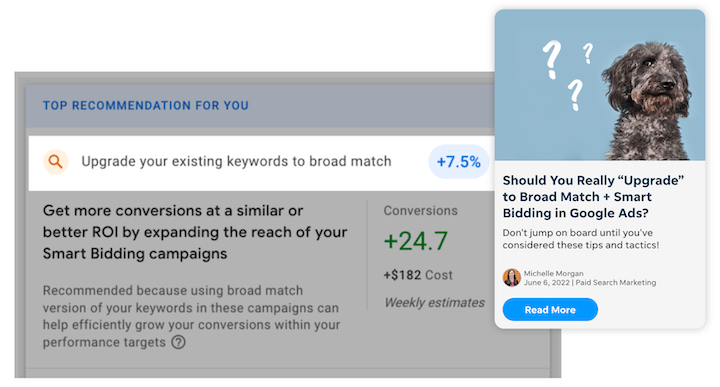
Michelle Morgan offers excellent advice on whether or not to use broad match with Smart Bidding here.
3. Try out click-to-Messenger ads
According to Andrew Hutchinson’s Social Media Today article, people on social are posting less to their entire following and shifting more toward smaller groups with DMs. Andrew himself doesn’t think people are going to be as keen to message with brands, but Hootsuite covers social customer service through social chatbots pretty extensively in its 2023 social media trends report. That said, it could be worth trying out click-to-Messenger and click-to-WhatsApp ads to see if they can be a means of reaching your audience in a channel they’re using more frequently.
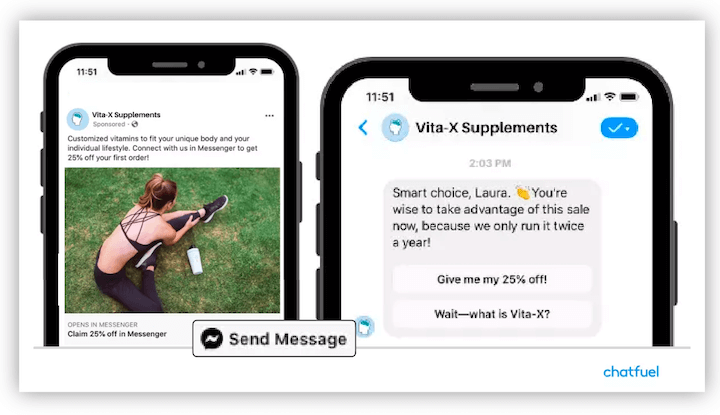
Use these tips from Brett McHale on how to turn Messenger campaigns into lead-generating chatbots for your business.
4. Lean into automation
It’s easy to fall into this mindset of anti-automation, especially as Google continues to make its pushes. But the reality is that there are many aspects of automation that do help us out. Just not when we rely on them entirely. The key is to know which features to use and which ones not to use.
- Smart campaigns? Don’t do em.
- Broad match + Smart Bidding? Stay away.
- Responsive search ads? Highly effective (plus, your only option) when you know how to use them right.
- Automated bidding? Helpful with the right strategy.
- Performance Max? Good for the right business and budget.
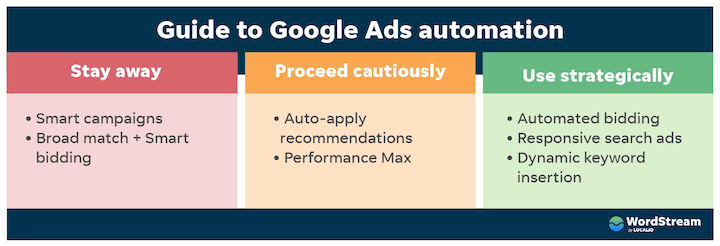
Remember too that automation and machine learning are necessary for the privacy-friendly targeting and reporting solutions Google is working on as we prepare for the deprecation of third-party cookies.
The bottom line is, automation and machine learning are only going to become more prominent, so it’s important to take the time to understand how and where to make it work for your business.
The best SEO & website strategies for 2023
As much as the SERP changes, SEO is one marketing channel that doesn’t change much. Our job is to produce useful content and Google’s job is to evolve the SERP to surface that content. But there are some adjustments for this year to keep in mind.
5. More closely align your SEO & CRO
Google Analytics 4 (GA4) is replacing Universal Analytics (UA) in July. For starters, make sure you get your GA4 property set up asap. Since it uses an entirely different model, your UA data will not be available as historical data in GA4.
While this is a major bummer, this different model offers a ton of advantages, including more customer-centric reporting and measurement. For example:
- The ability to see visitor journeys across devices in one property.
- Customer lifecycle reports.
- Machine learning insights and predictions around purchases, churn, and revenue.
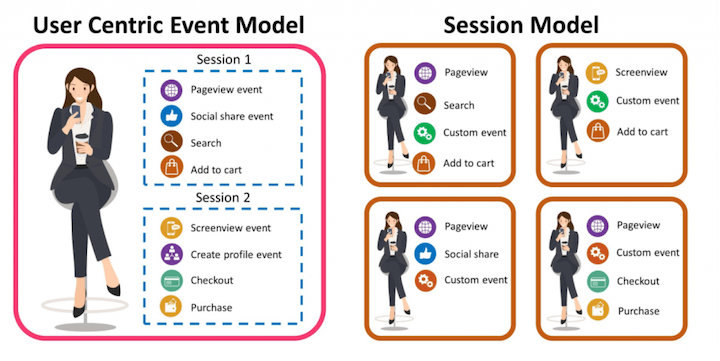
This is going to make it easier for us to focus on quality over quantity. To take advantage of this, GA4 is going to require you to revisit your SEO metrics and KPIs and to more closely tie them to your CRO and your revenue goals.
This means you’ll want to know how to assign conversion values (even if you’re not ecommerce). You can learn more about UA vs GA4 here.
6. Focus on niche expertise
According to FirstPageSage, there have been a few changes in the weights assigned to the different Google ranking factors. In particular, niche expertise has increased and trustworthiness is a new factor.
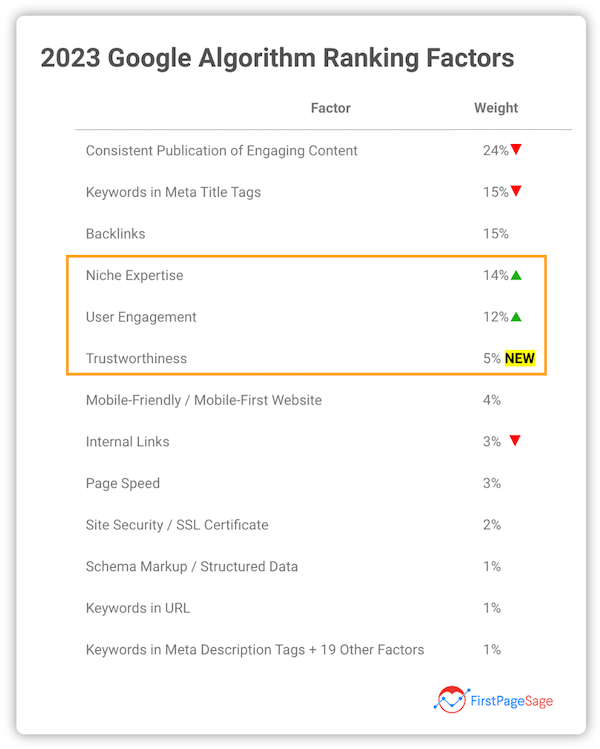
Now, this isn’t an exact science, and even the factors that “decreased” in weight are still of the utmost importance. But also, Google updated its search quality rater guidelines in July, which revamped its definition of low-quality pages; and rolled out its new helpful content update system in August.
This all points to a growing emphasis on establishing expertise in your niche. What does that look like?
- Produce quality content not just on anything in your industry, but on the key topics related to your core offerings.
- Recruit subject matter experts in your company and industry as blog authors and optimize your author bios.
- Promote your posts on social, and encourage influencer authors to promote to their networks as well, for social signals.
- Use pillar pages and internal linking for topic authority and better ranking in general.
7. Simplify your SEO content
On a similar note, don’t confuse in-depth content on topics in your niche with convoluted content. This means two things:
Keep your cluster pages focused. Take a look at the below example of a Google Ads ultimate guide pillar page and its cluster pages.
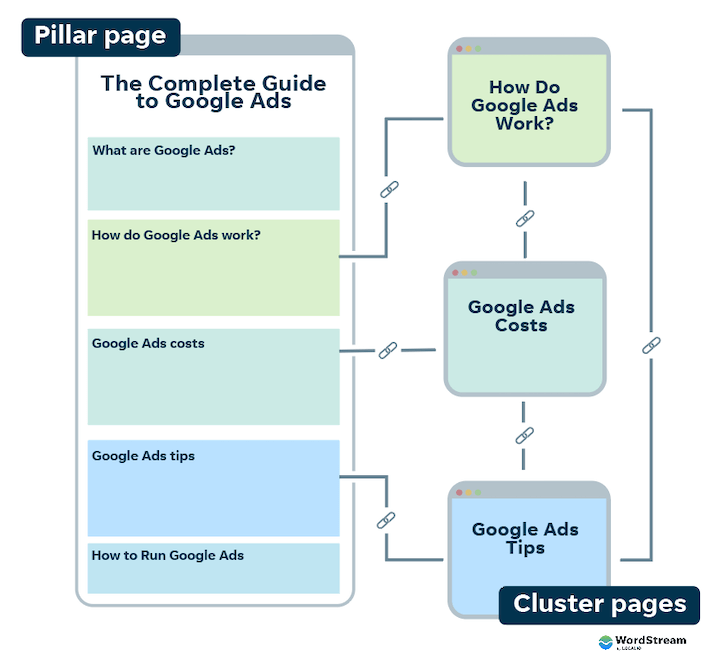
While your pillar page should include a Google Ads costs section, your Google Ads costs cluster page doesn’t need “what is Google Ads” and “why are Google Ads important” H2S. Keep your cluster pages tightly aligned to the main keyword.
Keep your sections clean. In my editing experience over the past year, I’ve found myself doing a lot of clean-up. Writers submit pieces that have a lot of useful information, but there is too much overlap in the sections. For example, I’d get a 101 beginner’s guide post that had:
- A ton of “what is” information in the intro
- Too many benefits discussed in the “what is” section even though there’s a benefits section right below it,
- Lots of great tips in the “how to” section that should be in the “tips” section.
I found myself moving the content around so it would go in its proper section, and oftentimes removing it since it got repeated in its proper section.
When you’re writing for SEO, you need to think in terms of a person seeking answers, not knowledge. They search for something, they pick the article on the SERP that they think best answers that question, and then they look in the article for that answer. There is less of a desire to consume and absorb and more of a desire to get to what they’re looking for and move on.
So keep your sections super clear and distinct, and make your post simple to navigate with a table of contents and clear headings. Not only will this satisfy readers, but it will also make it easier for Google to surface specific answers in rich results and featured snippets. This gives each individual piece of content, and section within your content, the highest chances of ranking on the SERP and delivering value to your target audience.
8. Use popups to collect first-party data
It’s been a long, slow breakup saga with third-party cookies. For two years now we’ve been telling you to build your first-party data. Hopefully, you’ve jumped on that train because at some point, there will be a third-party cookieless world. But practically and tactically speaking, what does that look like?
One of the best ways to collect first-party data is through quality email list building. Now there are a number of ways to do this on your website, but one of the most effective is through popups, and here’s how:
- Create gated content (useful guides and free tools) that align with the main categories on your blogs.
- Promote them via popups unique to each blog category.
- Require users to fill out a form with enough information to go through your lead scoring system.
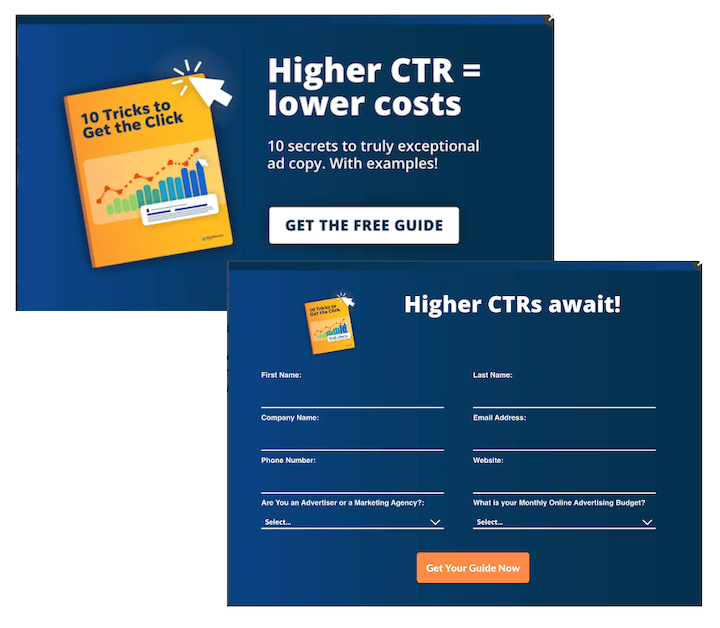
Now you have lists of leads that you can nurture with emails and upload as seed audiences for lookalikes. How do I know it works? Because we use popups and it is our biggest driver of qualified lead generation on our site! Learn how to create non-annoying conversion-boosting popups here.
The best email & social media marketing strategies for 2023
Email and social media remain the best ways to engage with current and potential customers. Let’s take a look at some
9. “Choose your own adventure” emails
Take a look at any 2023 email marketing trends post out there right now and you’ll find interactive emails on that list. This is where the user can take an action right in the email—like voting, reviewing, purchasing, etc—without going to a landing page right away. This is probably a little more feasible for bigger brands, but something you can do that is in line with this trend is to go with a “choose your own adventure” style email.
You can still have a central call to action, but cater it to different user personas or make it more appealing with different ways to approach it. Here’s an example from Hootsuite.
It reads: “Tap on your biggest priority for next year to get key insights and clear actions you can start taking now.”
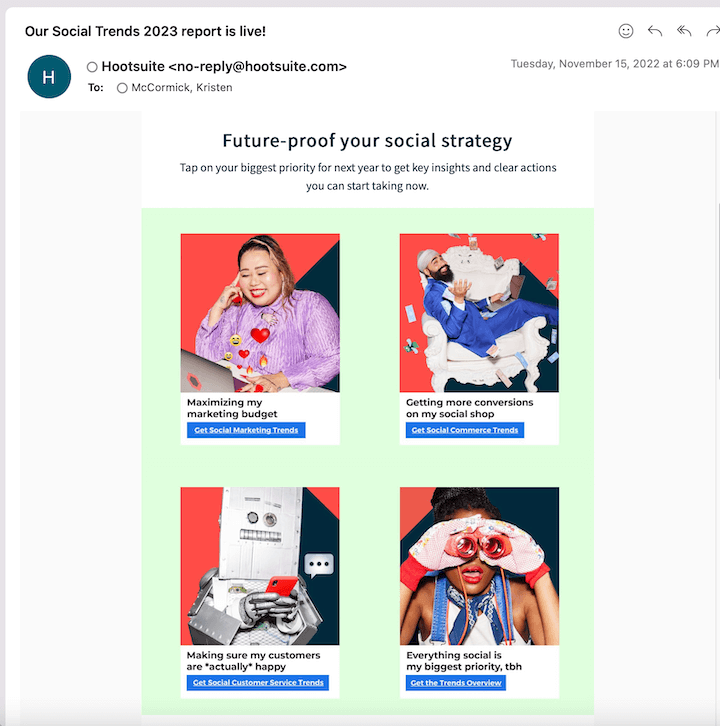
Note that this also makes the email more personalized and even more inclusive.
10. Treat every platform like TikTok
Legacy social media platforms are going through an identity crisis as TikTok takes over the world. It’s hard to say whether they’ll find ways to distinguish themselves or just evolve to be more like TikTok, but as of right now, we’re seeing more of the latter.
What that means for you is, even if your top channels are still Facebook and Instagram, you should be creating content with the mindset that your audience has TIkTok-like expectations on there. That means focusing on:
- Engaging, short-form video content (Reels, Stories, Shorts). Use our Instagram Story templates!
- Keeping it real (think somewhat unpolished but still tasteful).
- Hooking users in the beginning.
- Maintaining engagement with entertainment (you can still be educational while providing entertainment)
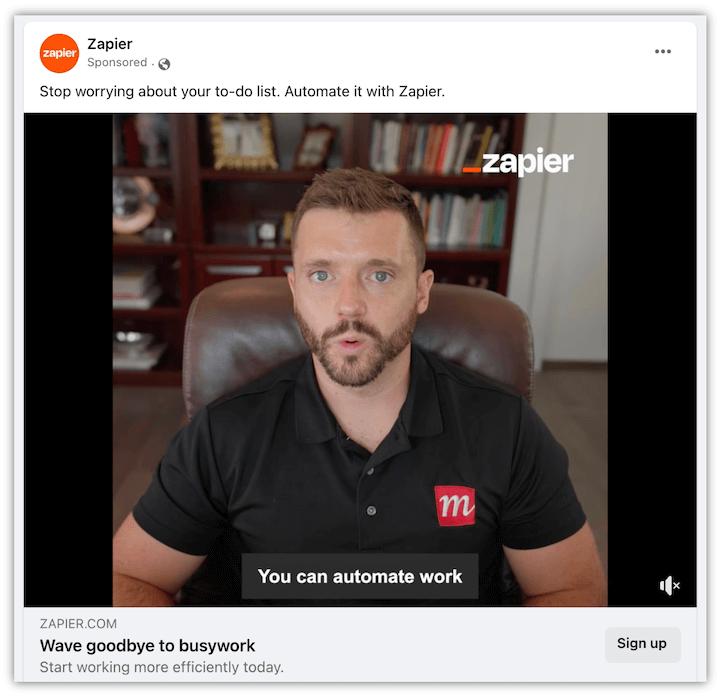
The TikTok Influencer talking head style is the way to go on all social platforms.
For more tips, head to our post on how to increase engagement on Instagram or check out these YouTube video ideas.
11. Social engine optimization
According to this Tech Crunch article, 40% of Gen Z prefers to use TikTok and Instagram for search instead of Google, and that’s according to Google. So yes, it’s only 40%, and yes, that’s Gen Z, but the wheels are in motion. And before you know it, Gen Z is going to make up the biggest percentage of the consumer population.
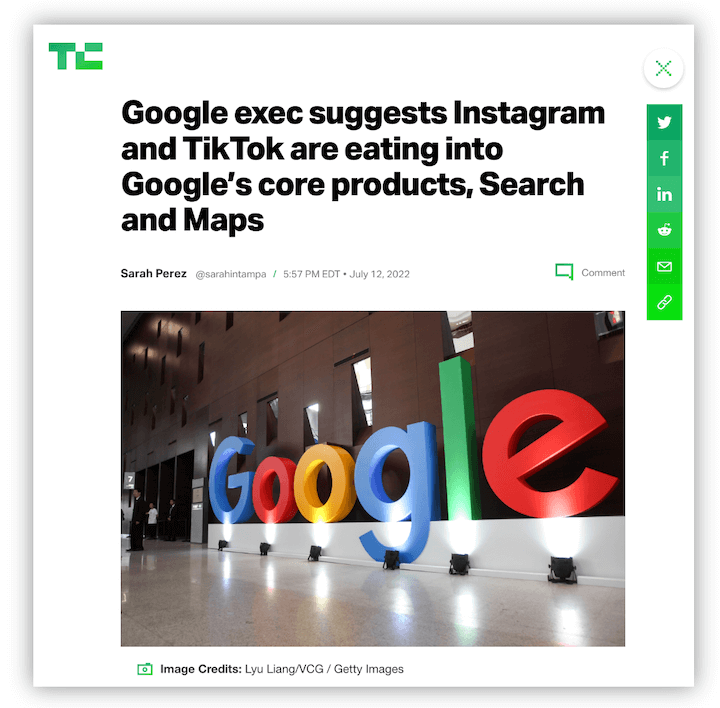
So get into the habit now of treating social platforms like search engines—for local and social search. That means properly categorizing and classifying everything with location tags, user tags, map pins, hashtags, and more. This way, you will have an archive of ranking signals stored up for the future when it matters most.
The best overall marketing strategies for 2023
As mentioned above, search advertising costs have increased—due to changes in the Google Ads platform but also because macroeconomic trends have caused consumers to become more conscious of their spending, which has likely lowered conversion rates. This is a broader theme to consider for your entire marketing strategy in 2023, and not just paid search. Here are two ways to adapt.
12. Build out a full-funnel strategy
This is by no means a new marketing strategy, it’s just more important than ever. Even though consumers are more conscious of spending and potentially more hesitant to convert, that doesn’t mean they’re not capable or able to convert—even if you sell non-essentials. We even read in GWI’s 2023 Consumer Trends Report that “A cost of living crisis doesn’t mean consumers won’t treat themselves.”
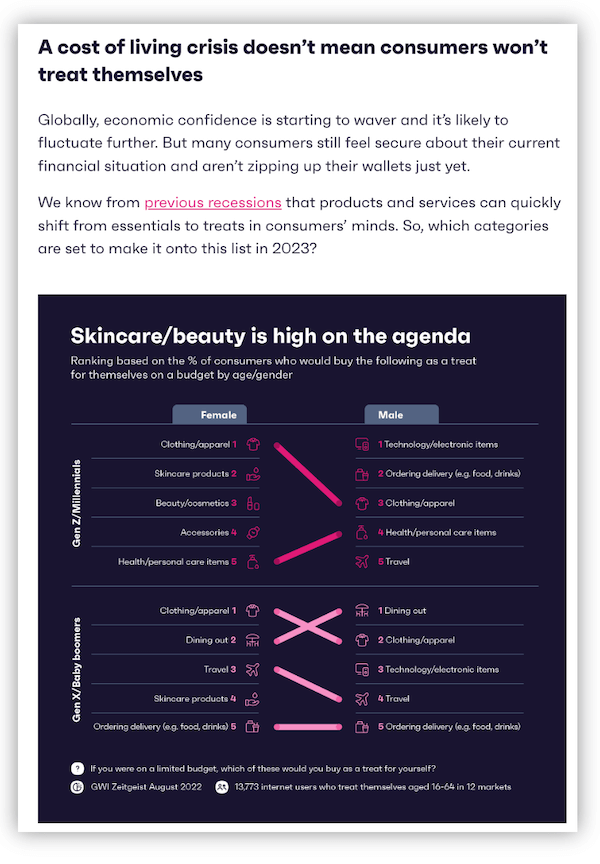
All that being said, If you’re overly focused on bottom-funnel conversions, you might run into some challenges. With a full-funnel strategy, you can capture leads and customers with lower-friction offers, and then nurture them through your funnel from there. This doesn’t mean coaxing them through—it means demonstrating your value and earning their trust over time so that they are more confident they are making a worthwhile investment. This is what perceived value is all about.
Plus, with more ads appearing on non-commercial SERPs, you might be able to benefit from advertising upper funnel offers like ebooks.
13. Illuminate identity & expression
Between Gen Z becoming a bigger percentage of the consumer population, diversity and inclusion efforts increasing among brands, and the individualized nature of social media in general having such an influence over our lives, the importance of identity and expression is truly in the spotlight at this point in time.
People want to feel heard, seen, and appreciated. In 2023 and beyond, it’s going to be important to weave this concept into your entire brand identity. So make sure to:
- Represent a variety of identities in your imagery (gender, sexuality, ethnicity, religion, physical ability).
- Run customer feedback and plain old customer appreciation campaigns.
- Encourage your audience to celebrate their uniqueness, choose their own adventure, and own their story.
The best marketing strategies for 2023 (recap)
As you can see, search engines, social, email, and a mix of paid and organic strategies is still the way to go. Here is a recap of the best marketing strategies for 2023:
- Go broad on Facebook
- But not on search
- Try out click-to-Messenger ads
- Lean into automation
- Align your SEO and CRO
- Focus on niche expertise
- Simplify your SEO content
- Use popups to build first-party data
- Choose your own adventure emails
- Treat every platform like TikTok
- Social engine optimization
- Full funnel strategy
- Illuminate identity and expression
The post The 13 Best Marketing Strategies for Small Businesses in 2023 appeared first on WordStream.
* This article was originally published here
No comments:
Post a Comment